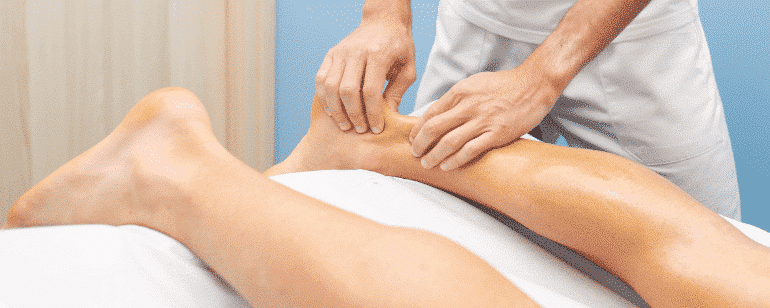Plantar fasciitis is an inflammation that affects the tendon plate of the sole of the foot. In most cases, the inflammation is triggered by overuse. If affected persons feel heel pain, it can be assumed that the attachment of the tendon plate on the heel bone is affected by overload.
Plantar fasciitis can have several causes. Athletes who do not stretch the foot area sufficiently before their exercise sessions are often affected by inflammation of the fascia. Likewise, shortened Achilles tendons can lead to pain and inflammation on the sole of the foot. However, obesity can also put so much stress on the tendon plate of the sole of the foot that inflammation occurs. Certainly, small injuries or wrong appearance can also be the reason of plantar fasciitis.

It is strongly recommended to consider treatment already at the first pain in the heels, otherwise chronic inflammation of the tendon plate may result.
Plantar fasciitis symptoms
In the case of initial plantar fasciitis, pain in the heel area becomes noticeable, which is especially noticeable during exertion. If the inflammation is advanced, the pain also appears at rest. The heel pain is noticeable in the form of a pulling or burning sensation and can increase to the point that simple activities such as walking or climbing stairs become difficult.
Treatment of plantar fasciitis with heel pain
In general, the following applies: In the case of inflammation, the body should be spared as much as possible. Since plantar fasciitis is an inflammation, it is recommended to relieve the heels and perform movements as gently as possible. Athletes are advised to stretch the muscles sufficiently before starting their sports activities to avoid injuries and inflammations in the area of the feet. Unstretched tendons and muscles can become inflamed more easily and, in the worst case, even tear.

So, if you are already suffering from initial heel pain, you should reduce your sports activities and stretch your muscles extensively before starting. The exercises should focus on the muscles of the calves as well as the soles of the feet.
Customized shoe insoles can also serve to relieve the fasciae. These should ideally be recommended by a physical therapist who can get to the root cause of the pain in the heels. He or she may also prescribe bandages or perform massages to relieve pain and reduce pressure on the tendons.

In most cases, plantar fasciitis associated with severe heel pain can be cured. Treatment is usually lengthy, especially if there is a long wait after the onset of initial pain. The sooner measures are initiated for healing, the faster this can occur.
